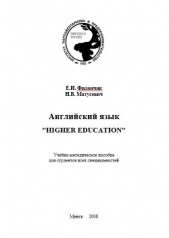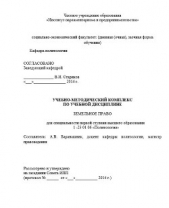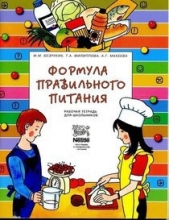Английский язык. Higher education

Английский язык. Higher education читать книгу онлайн
Настоящее учебно-методическое пособие предназначено для студентов социально-экономического факультета ИПП как дневной, так и заочной формы обучения, изучающих социокультурный и/или лингвострановедческий курс английского языка. Рассчитано на 72 часа аудиторной работы для студентов гуманитарных и экономических специальностей на дневной форме обучения, 30 часов и 10 часов соответственно для студентов гуманитарных и экономических специальностей на заочной форме обучения, что отображено в разделе 1 пособия.
Характер данного пособия определяется целью, которая ставится при обучении иностранным языкам в неязыковых вузах - углубление иноязычных знаний и формирование коммуникативных навыков и умений студента. Данное пособие призвано обеспечить студентов тематически упорядоченным языковым материалом, который может служить основой для развития и закрепления навыков, необходимых для глубокого понимания содержания иноязычного текста, анализа прочитанного, подготовки к монологической и диалогической речи, а также для письменных сообщений.
Внимание! Книга может содержать контент только для совершеннолетних. Для несовершеннолетних чтение данного контента СТРОГО ЗАПРЕЩЕНО! Если в книге присутствует наличие пропаганды ЛГБТ и другого, запрещенного контента - просьба написать на почту [email protected] для удаления материала
2. All colleges, polytechnics and vocationally oriented schools are free of charge.
3. Polytechnics and vocationally oriented schools give higher education.
4. British students do not get grants.
5. It usually takes 5 years to get a Bachelor of Arts or Bachelor of Science degree.
ACTIVITY I
SUPPLEMENTARY READING:
PART I
DIRECTIONS:
Read the text, translate it into Russian and retell in English. Pay attention to the Vocabulary:
chapel ['t/aepl] — часовня
row [rou] — ряд
valuable ['vaeljuabl] — ценный
Text 3 OXBRIDGE
OXBRIDGE is a combination of two famous names — Oxford and Cambridge. They are the oldest universities in Great Britain. They have dominated British education for seven centuries.
The University of OXFORD, situated in the city of Oxford in England, is the oldest university in the English-speaking world. The first of its colleges was founded in 1249. The university now has 34 colleges and about 12 000 students, many of them from other countries. There were no women students at Oxford until 1878, when the first women's college, Lady Margaret Hall, opened. Now there are 5 women's colleges. Oxford is a member of the Russell Group of research-led British Universities. It has recently come top of some league tables which rank universities in Britain.
Oxford is, like Cambridge and others, a member of the Coimbra Group, a network of leading European universities, and the LERU (League of European Research Universities).
CAMBRIDGE is the second-oldest university in Great Britain. It was founded in 1284 when the first college, Peterhouse, was built. Now there are more than thirty colleges founded at different times, three of them are women's colleges. The first women's college was opened in 1869.
Cambridge has produced more Nobel prize winners than any other university in the world, having 80 associated with it, about 70 of whom were students there.
It regularly heads league tables ranking British universities, and a recent league table by the Times Higher Education Supplement rated it sixth in the world overall and first for science.
Oxford and Cambridge are famous for their first class education. The universities have societies and clubs for different interests. Sport is an important part of students' life.
Both of these university towns are very beautiful. They have some of the finest architecture in Britain. Some of their colleges, chapels and libraries are very old and full of valuable books and paintings. Both towns have many lovely gardens.
During term time the university towns are full of bicycles. Students ride along the streets on them, and there are rows and rows parked outside the colleges. In the towns of narrow streets, a bicycle is the best means of transport.
The universities of Oxford and Cambridge, often referred to together as Oxbridge, compete to be seen as the strongest overall university in the UK. Historically, they have produced a significant proportion of Britain's prominent scientists, writers and politicians.
PART II
DIRECTIONS:
Mark the statements below as ‘ True ‘ (T) or ‘ False ‘ (F)
The University of Cambridge is the oldest university in England.
The University of Cambridge was founded by scholars from Oxford.
Many Nobel Prize winners were students at the University of Cambridge.
Many scientists, writers and politicians were students at the University of Oxford and the University of Cambridge.
The University of Oxford is the oldest university in England.
Oxbridge is the old name of Oxford.
There has always been a competition between Cambridge and Oxford.
The University of Oxford and the University of Cambridge are members of the Coimbra Group.
T
F
UNIT 3
TOPIC “ HIGHER EDUCATION IN THE USA ”
TOPICAL VOCABULARY
Read the expressions and translate them into Russian:
Apply — to ask for;
applicant — a person who applies for a position;
record — facts known about the past of sb; high school record;
Scholastic Aptitude Test (SAT) — a test which discovers the knowledge and skills of the student; community — the people living in one place, district or country; a community college;
Bachelor of Arts (BA), Bachelor of Science (BS) — a man or woman who has taken the first university degree in arts or science;
Master of Arts (MA), Master of Science (MS) — the holder of the second university degree in arts or science;
Doctor of Philosophy (Ph. D) — a person who has received the highest university degree;
tuition — teaching;
tuition fee — a payment for teaching;
income — money received during a given period;
install — to place, fix (an apparatus) in position for use.
VOCABULARY EXTENSION
I. professor — teacher
A professor (BrE) has the highest position in a university department, or (AmE), teaches at a university. We address a man as Mr + surname or as Sir, and a woman as Miss/Mrs + surname; we address a professor, male or female, as Professor + surname. A teacher teaches in a school.
E.g. He was Professor of Physics and head of his university department at the age of 26.
Mr Jones was a teacher of History before he became a headmaster.
II. director — manager — headmaster (principal)
A headmaster/headmistress — a man/woman in charge of a school.
Syn.: the head, the headteacher, the principal
E.g. When I was at school, the headmaster always took charge of morning assembly.
A manager is a person who runs part of a business.
A director is someone in charge of a business. We can speak of the director of a language school because it’s a business.
E.g. Jack is very young to be a bank manager/a manager of a supermarket.
It has never been my ambition to be a company director.
III. programme — syllabus — curriculum — program.
A syllabus is set in one subject either by a school or by an examination board.
A curriculum is the general programme in all subjects.
E.g. There is a new syllabus for next year’s Certificate in Advanced English.
Art isn’t on our school curriculum.
A programme is a sequence of planned activities, or an information booklet.
E.g. What’s your programme for today?
This concert programme (BrE)/program (AmE) is very expensive.
A program is a computer program (BrE/AmE)
E.g. Have you seen Microsoft’s new program?
GETTING STARTED
What do you know about the system of education in the USA?
Do you know the difference between the US colleges and universities?
ACTIVITY A
VOCABULARY STUDY
PART I
DIRECTIONS:
Teacher and its alternatives.
Match the word on the left with their definitions on the right.
1. coach a. person who trains athletes or animals























